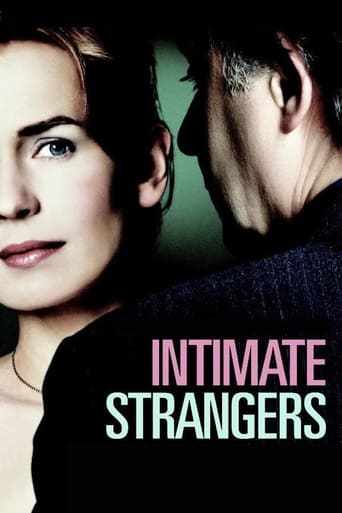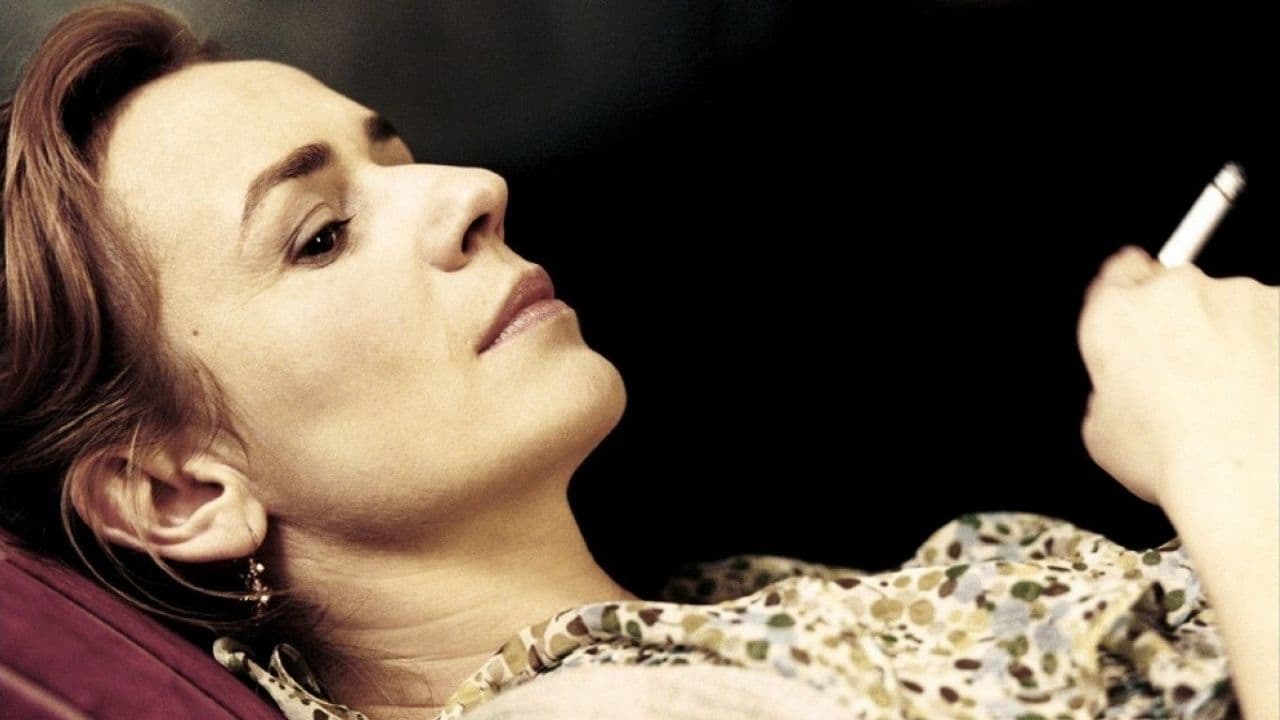bandw
If you are a tax attorney and a beautiful woman walks into your office and starts telling you intimate details about her marriage, it is perfectly understandable that you might easily mistake her for a client. This is what happens to William (Fabrice Luchini) when Anna (Sandrine Bonnaire) walks into his office, having mistaken him for a psychiatrist. It takes the enraptured William a while to realize what the confusion is, but the meeting is over before he can come clean. Having this comely woman in his office probably dampened his desire to come clean anyway. In fact, it is not until the third meeting before he confesses the truth, by which time Anna has already figured it out. The interesting twist is that she still comes to regular meetings, and that begins the relationship that drives the plot for the rest of the movie.Luchini has the perfect demeanor for playing the buttoned down tax attorney who is obviously smitten but retains a professional reserve. There is a wonderful scene that has Luchini doing an uninhibited solo dance in his apartment to Wilson Pickett's "In the Midnight Hour" that shows that there is bit of a wild man behind William's composed exterior. That scene alone is worth the price of admission. Complexities develop as the spouses are introduced and William seeks the advice of the psychiatrist that Anna originally thought she was seeing.This movie has a very clever script that has humor, suspense, drama, tenderness, and human insight. I like the result that simply listening to a Anna's troubles was therapeutic for her (and for William as well). Maybe he could just as well have been a psychiatrist.The main message being delivered is that it is not necessary to make the beast with two backs to have an intense sexual relationship.
Framescourer
There is no coincidence that this film's original score (Pascal Estève) sounds like Bernard Hermann's for Hitchcock's Vertigo. The film is one of mistaken or concealed identities, delusion and obfuscation. It also investigates the equivocal nature of the art/science of professional psychiatry. Above all it's an unnatural story about love.Fabrice Luchini plays his tax consultant mistaken for a shrink as a retentive, inscrutable but humane geek. The effect of Sandrine Bonnaire's neurotic but strident and alluring 'client' engaging him in (initially erroneous) therapeutic conversation is difficult to judge. The only clues offered are in the elliptical relationships he has with other people, such as his former lover (an excellent, cool Anne Brochet) or the real therapist (Michel Duchaussoy, a French Brian Cox).Director Leconte is well-versed in concealing or creating twists and turns in his plots; L'Homme du Train is a good example. The wonder of this quiet but emotionally taught essay in love and understanding is whether the story reveals itself in the experience of watching rather than in its outcome. Evocative, touching but disorientating: and watch a good way through the credits if you don't know quite what I mean by that. 6/10
Dennis Littrell
(Note: Over 500 of my movie reviews are now available in my book "Cut to the Chaise Lounge or I Can't Believe I Swallowed the Remote!" Get it at Amazon.)This is the most nuanced of Patrice Leconte's films that I have seen. Everything is carefully constructed at a measured pace with just enough revelation as we go along, but no more, so that we can follow the plot's development easily. The film is cut as close as a barber's shave and is as neat as a pin.Anna (Sandrine Bonnaire), who is a bit of a tease, finds herself in what she thinks is a shrink's office. (There's a magazine on the desk whose title is partially obscured so that only the word "analyst" appears to her eyes, thereby confirming her expectations.) Behind the desk however is William Faber (Fabrice Luchini) who is a tax accountant and perhaps the last man in the building who could conceivable help Anna with her marital problem. He is after all something of recluse. He doesn't drive. He usually eats alone in his apartment, which apparently is the same place as his office, watching TV (in one scene it's Humphrey Bogart as Phillip Marlowe with French subtitles). He is only marginally experienced in the ways of human relationships and knows little about psychoanalysis. (The "analyst" magazine on his desk was on economic analysis.) She flips a zippo cigarette lighter, lights a cigarette like someone new to smoking, and begins to tell a somewhat astonished Faber about the intimate details of her married life, mainly that her husband won't touch her anymore.I previously saw Bonnaire in La Ceremonie (1995), directed by Claude Chabrol, in which she played a mean, hateful housemaid, and she was very good there. Here she is playful, almost childish at times, as she reveals her life to this stranger.This is the first time I have seen Luchini who is very properly Parisian in his carefully knotted tie (worn even while preparing his solitary meal). His acting style is markedly laid back. He carries an almost continual look of surprise on his face--astonishment almost--with his eyes made big and round and his demeanor controlled and taciturn.Because Anna is so direct and begins talking about herself almost immediately and because Faber is a most polite man who will not interrupt her, it is several minutes before he has the opportunity to advise her that she really wants the office down the hall where the psychoanalyst Dr. Monnier holds forth. By then he is intrigued with her and smitten, and is slow, very slow, to advise her of her error.Also because Anna likes to talk about herself like a teenager and because William Faber is a practiced listener, there is a certain simpatico that automatically develops.One can see where this is heading. She talks, he listens. She performs, so to speak; he appreciates. Faber is the kind of man, as his "ex" points out, who never makes the first move. This is good for Anna because it allows her to become comfortable with him before she has to respond.The complications begin with the appearance of Anna's husband who first makes an unusual sexual demand of the very proper tax accountant, and then when that is refused, treats Faber to a most upsetting motel scene through a window across the way. Yes, it's a little contrived (as is the movie's premise). But I like the way Leconte didn't let us see the scene and only revealed later what Faber had seen.Near the end of the film we see Faber for the first time sans necktie, which we can guess signals a change in the man. The film ends in a most artistic way with a shot from above as Anna lies stretched out on a classic analyst's couch in a cute frock with her ankles crossed and Faber... Well, we see the credits roll down the screen and we can imagine what will eventually happen.My favorite Leconte film is Ridicule (1996). I also liked his La Fille sur la pont (1999). If you haven't seen his work you are in for a treat. He is witty in a sly way (especially here in Confidence trop intimes) and can be strikingly original. Like all good directors, he never loses track of the audience and the needs of the audience. His films are carefully cut so that we always know what is going on, but without any heavy-handedness.See this for Patrice Leconte, one of France's most talented film makers.
Jon_Leon
*Intimate Strangers* is a mature maneuver away from the romantically ideal *Girl on the Bridge.* An intriguing element is the quietudinous anxiety beaming from the two main characters Anna and William, a pair of lonely hearts seemingly banal in their petty bourgeois routines but tastefully adventurous beneath. William's insistence as a listener and his willingness to make his clients with appointments wait for him to finish a "session" with Anna are triumphant and miniature rebellions against the routinized/mechanized clockwork of work-a-day life.The film requires a patience in the viewer as well with most of the scenes enacted inside of William's tax lawyer squeaky clean office. The dialogue is precise and crisp. There is not a line of filler in the entire film and the colors are bewilderingly attractive.For it's realistic exhibition of commonplace drama and its bravery in composure *Intimate Strangers* is a necessary mystery in the psychiatry of ordinariness.



 AD
AD



